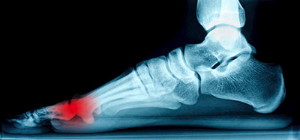Sesamoid Bone Injuries
Monday, 05 April 2021 00:00 The sesamoids are small, round bones found in several parts of the body, including the feet. The sesamoids of the feet are roughly pea-sized and are located under the big toe. The sesamoid bones in your feet give you extra leverage and power when pushing your foot off the ground. When repetitive impacts from running or other activities become too much for these bones to bear, they may become inflamed or fracture. A sudden onset of sharp pain in the toe area can be a sign of a sesamoid fracture, while nerve pain or a burning sensation in the toe can indicate nerve damage. Sesamoiditis may cause symptoms such as swelling, tenderness, and difficulty bearing weight. If you are experiencing the symptoms of a sesamoid injury, please seek the care of a podiatrist.
The sesamoids are small, round bones found in several parts of the body, including the feet. The sesamoids of the feet are roughly pea-sized and are located under the big toe. The sesamoid bones in your feet give you extra leverage and power when pushing your foot off the ground. When repetitive impacts from running or other activities become too much for these bones to bear, they may become inflamed or fracture. A sudden onset of sharp pain in the toe area can be a sign of a sesamoid fracture, while nerve pain or a burning sensation in the toe can indicate nerve damage. Sesamoiditis may cause symptoms such as swelling, tenderness, and difficulty bearing weight. If you are experiencing the symptoms of a sesamoid injury, please seek the care of a podiatrist.
Sesamoiditis is an unpleasant foot condition characterized by pain in the balls of the feet. If you think you’re struggling with sesamoiditis, contact Dr. John C. Lawlor of Florida. Our doctor will treat your condition thoroughly and effectively.
Sesamoiditis
Sesamoiditis is a condition of the foot that affects the ball of the foot. It is more common in younger people than it is in older people. It can also occur with people who have begun a new exercise program, since their bodies are adjusting to the new physical regimen. Pain may also be caused by the inflammation of tendons surrounding the bones. It is important to seek treatment in its early stages because if you ignore the pain, this condition can lead to more serious problems such as severe irritation and bone fractures.
Causes of Sesamoiditis
- Sudden increase in activity
- Increase in physically strenuous movement without a proper warm up or build up
- Foot structure: those who have smaller, bonier feet or those with a high arch may be more susceptible
Treatment for sesamoiditis is non-invasive and simple. Doctors may recommend a strict rest period where the patient forgoes most physical activity. This will help give the patient time to heal their feet through limited activity. For serious cases, it is best to speak with your doctor to determine a treatment option that will help your specific needs.
If you have any questions please feel free to contact one of our our offices located in Cape Coral and LaBelle, FL . We offer the newest diagnostic and treatment technologies for all your foot and ankle needs.








